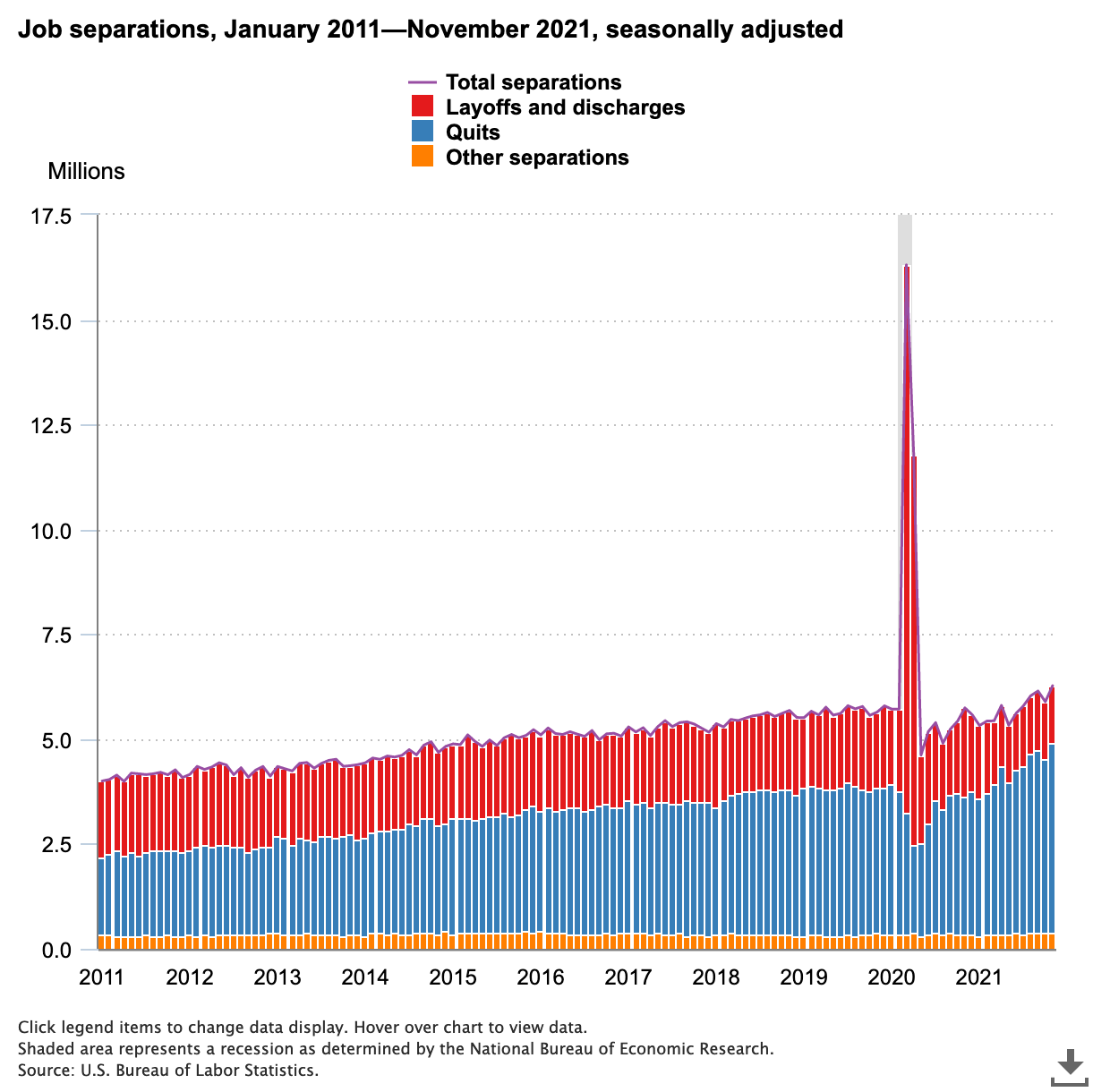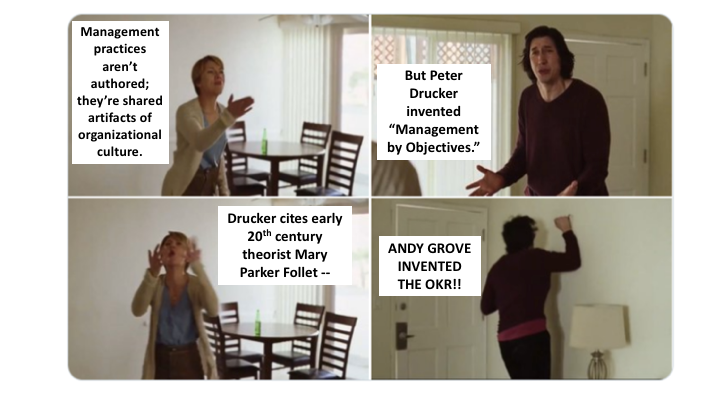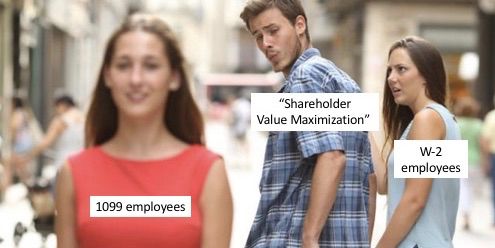Warm Take: have you been memed?

Repetition can transform a belief into something that feels like truth. Media and social media, a flywheel, produce truthy objects at an ever increasing velocity.
Like memes, which Joan Donovan, Emily Dreyfus and Brian Friedberg believe mobilized the crowd that descended on the US Capitol on January 6, 2021.
How Memes Led to an Insurrection, by Joan Donovan, Emily Dreyfus and Brian Friedberg, in Atlantic Magazine, September 2022
There are plenty of memes about our workplaces. The suite of memes that follow onto the so-called “Great Resignation” (GR) have been resonant, imo, in our attempt to make sense of a confusing, constantly changing, landscape.
I have pushed back on the GR, hard. Partly, I've worried that it would move from "the wires to the weeds" – that the meme would precipitate real-life career moves that might not work out as planned.
Also, I haven't seen the GR backed up with believable-to-me numbers. Over and over the same story is repeated – interviews with X people, with quotes about their journeys. “In America, a pioneering group of workers are quitting their jobs; these are their stories.” Dun dun.
For a change of pace, check out Who are America’s Missing Workers? by Lydia De Pillis at New York Times. De Pillis' analysis cites trustworthy and authoritative resources, and the GR doesn't come up once. She hits points that actually matter: early retirements; dampened legal immigration; lower labor participation rates for working-age men; long Covid. And she refers to the murkiness of all of these numbers and how they fit together: nobody has made sense of all of this.
No wonder we're meming?
So, I mean, dear well-funded mainstream media: more of this. Please. Don’t write about the meme: unpack it.
I fell into a giant Internet thicket looking for a simple explainer about the US Bureau of Labor Statistics, and how it establishes, and then revises, its numbers.
Many widely-cited BLS employment numbers count "non-farm workers." People who receive 1099s, like me, might show up in the US Census Bureau's monthly household survey, which is used for some BLS statistics. But I don't believe you'll find us in the BLS job separation numbers.
So, imagine a worker who wants to spend less time in contact with the general public, because Covid. What if they trade their retail food service job for a gig-economy delivery job, where they'd arguably spend more time alone in their vehicle? Would they look like a quitter? And how would their move into 1099 work affect employment numbers? (Unclear to me at the moment. I'll dig more on this one.)
260,000 working age people in the US have died from Covid, according to DePillis. I've wondered about this! However, the BLS counts deaths in "other separations." And, there's not a visible post-Covid bump in "other separations." Weird.

I also wonder about caregivers of people who have Covid, or long Covid.
A sampling of what I've had to say about (and with) memes
- Warm Take: A Great Discontinuity, April 2022. This article links to one of the best things I've read about managing the mood/vibe of the so-called Great Resignation.
- Warm Take: The Resignation is actually not that great, December 2021.
- Warm Take: Your Job Will Not Save You, August 2020. The authors of How Memes led to an Insurrection cite "learn to code," as a meme, which I called out in this post for members, which I recently unpaywalled (and lightly edited.)

- The Story is the Story: On Management #40, January 2020. One of my favorite Twitter memories was when one of the most online-savvy people I know shared my meme about a frequently repeated belief. No, Andy Grove did not invent the OKR, lol.

- The Power of Myth (in Business): On Management #33, December 2018. "Shareholder value maximization is the law" is another oft-repeated untruth.
Thank you for reading my newsletter, and to the good people who support On Management. Many memes are borderless, but my view of the numbers is US-centric. So extra thanks to Canadian and international readers, for following my plot.
I always love to hear from you, and welcome your thoughts on the memes of the workplace, or any questions or topic ideas. I have a backlog of your reading recommendations to share, stay tuned and send more!
I've been thinking about this topic for a while, but like other Warm Takes, I wrote it on Sunday while drinking my coffee. So there may be typos, broken links, and shaggy turns of phrase. I'll probably fix some of them later, you know, on the Internet.
May you, your loved ones, co-workers, and communities be safe, healthy, and free.
Showing my work
Heather Cox Richardson's newsletters always have a list of links. Good idea. She shares raw links – a flex I'm not ready for yet (but understand, lol.) Here are some of my resources for this edition.
- How Memes Led to an Insurrection, by Joan Donovan, Emily Dreyfus and Brian Friedberg, in Atlantic Magazine, September 2022
- Who Are America’s Missing Workers? by Lydia DePillis at the New York Times, September 12, 2022.
- Employment Situation Summary, September 2022, US Bureau of Labor Statistics
- New data shows long Covid is keeping as many as 4 million people out of work, Katie Bach at Brookings Institution, August 24, 2022.
- The state of jobs and the US labor market, Stephanie Aaronson and Fred Dews, Brookings Cafeteria podcast, February 25, 2022
- Labor Force Statistics from the Current Population Survey, Concepts and Definitions, US Bureau of Labor Statistics.
- Bureau of Labor Statistics, U.S. Department of Labor, The Economics Daily, Number of quits at all-time high in November 2021 at https://www.bls.gov/opub/ted/2022/number-of-quits-at-all-time-high-in-november-2021.htm (visited September 24, 2022).
- What does the unemployment rate measure? by Stephanie Aaronson at Brookings Institution, February 18, 2021.
- How Economic Data Is Kept Politics-Free, by Patricia Cohen at the New York Times, November 3, 2016.
- Thomas Nardone, Kenneth Robertson, and Julie Hatch Maxfield, “Why are there revisions to the jobs numbers?” Beyond the Numbers: Employment & Unemployment, vol. 2, no. 17 (U.S. Bureau of Labor Statistics, July 2013)
- Hilbert College's LibGuide on using the Bureau of Labor Statistics, viewed September 25. 2022.
Many thanks to librarians, particularly the good people at Sherrod Library at East Tennesee State University, and University of Pennsylvania's Lippincott Library, who pointed to me good resources on employment statistics and the BLS.
